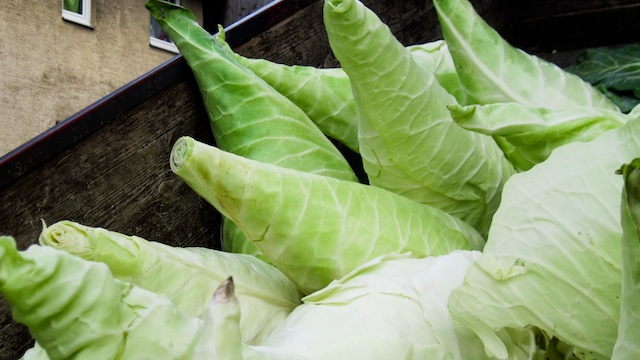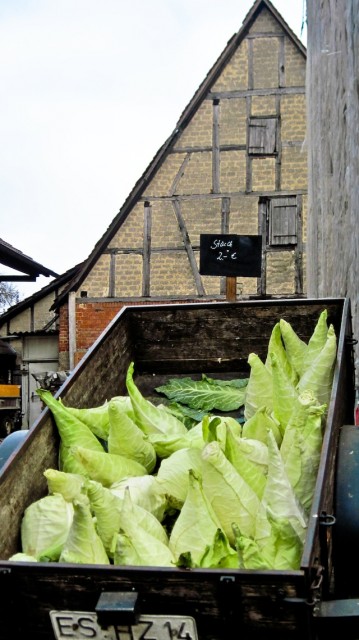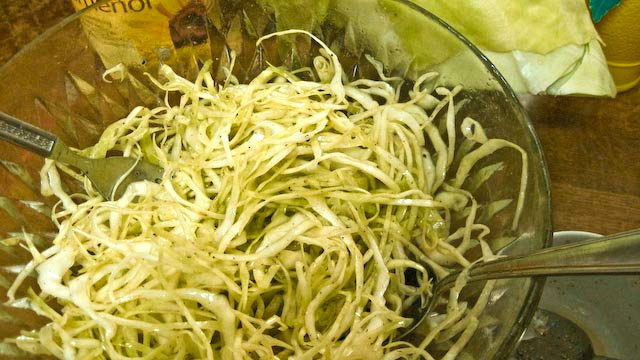Spitzen
November 15, 2011

My great uncle had always been old. From the time I was young, he’d been the same Hansvetter – I remember him in a newsboy cap, a cigarette in his hand, his feet covered in slippers. He loved to watch the planes take off from Stuttgart airport. He lived nearby and kept his TV programmed to a bluescreen listing of departures and arrivals so he’d know which planes were heading where as he watched them fly into the sky. When I’d visit, he’d ask when I was leaving, what plane I’d be on and tell me he’d track me as I took off.
A few distinct memories recur when I think of my great uncle. Every time we came by he’d ask, in a slow, loud Schwäbisch drawl if we understood what he was saying. It can’t be reproduced in print, but it’s something like that joke about Americans speaking loud, slow English in foreign countries as if it turns their words into something other than loud, slow English. For Hansvetter, it was a question of whether we could understand his dialect. And no matter how many times we said, yes, this crazy south German dialect (incomprehensible to even many northern Germans) makes complete sense to us, he’d always shake his head astounded and say, “Well, you just speak such good German.”
Well, yes, we’ve been speaking it our whole lives.
I drove to the South this weekend for Hansvetter’s funeral. On my way there, I thought of how our language and our dialect works to shape our selves. Such a large part of why I’m in Germany is to understand myself as well in this language as I do in English. Yes, Hansvetter, I grew up speaking German, but in a way, you’re right – it’s a foreign language to me still. And yet it’s personal. A whole half of my family is German, a whole half of me exists in another language.

We drove to the cemetery, passing a giant trailer full of cabbages, and then another, and another. These were the largest cabbages I’d ever seen, round and full at the bottom and then spiraling up into a peak. Spitzkraut, it’s called, or Filderkraut, after the area in which it’s grown. But I prefer Spitzkraut. It reminds me of what Hansvetter used to call my youngest brother: Spitzbub, an impish boy. My middle brother had even said, when we’d telephoned earlier in the week, “It’s weird not to have someone calling Michael Spitzbub.” – as if Hansvetter had a monopoly on the term.
We stopped at a stand whose placard, written in the Schwäbisch dialect read:
Wer im Herbscht
Sei Spitzkraut kauft,
der hot em Wender
Sauerkraut
The rough translation would be, “Buying Spitzkraut in the fall means winter saurkraut for all.” We bought a Spitzkraut and stuck it in the car before we went to the funeral. It might sound macabre, to take such joy in finding out about a type of cabbage I’d never seen before, right before going to a funeral. But I think Hansvetter would have appreciated my delight in the Schwäbisch saying on the sign, in a traditional Schwäbisch food. His grandfather, after all, had been a cabbage cutter.
It was like having a dialogue with Hansvetter – we talked about words and dialects, about how what we speak makes us belong to a place. I forgave him for always asking if we could understand. Then, it seemed a bit insulting, but I suppose that for him, my brothers and I were wonders – we lived in America, spoke English, and yet could understand a dialect most Germans from the North can’t comprehend.
My relationship to language is not an easy one – I am constantly reminded in Germany of how much I fit in and how apart I still am. But in memory of Hansvetter (whose comments always managed to bring up all my conflicted, complicated, defensive feelings about language), I made something simple. I took my Spitzkraut (thinking of Hansvetter calling Michael Spitzbub, how Spitz means point, pointy, top, the tip, peaked, how cabbage and children can be given the same prefix) and made a Krautsalat – just finely grated cabbage, vinegar, salt, pepper, oil, honey, and lemon. And that was enough.

beautiful, lyz.
A beautiful tribute to a kind man. Bless your soul, Hansvetter.
You show your soul when writing. This was a lovely tribute to Hansvetter, who would not have understood the English!
Lyz,
This piece made my day. You have found a deep insight in such an ordinary scene: a cabbage truck. The scene, unremarkable in of itself, serves as a portal to a body of experiences that comprise something really profound. I strive for the same in my own writing and photography, and this piece is an inspiration to me.
I am sorry for the loss of your uncle, but I am glad you were there, with a cabbage truck, to remember him.
Thank you for sharing.
Howell
[…] Cabbage gets a bad rep for being cheap and one-dimensional, but I would like to do a little salvaging on behalf of the image. Cabbage is versatile. Main ingredient in stir-frys and slaws, stew-filler, a hull for ground beef and spices. A pinch of crispness in a rice salad or the vinegary tang topping a pulled pork sandwich. And the types of cabbage – there’s red cabbage, green cabbage, Chinese cabbage, Savoy, Napa, bok choy – and here in Germany, I’ve discovered yet another lovely variety called Sptizkraut. […]